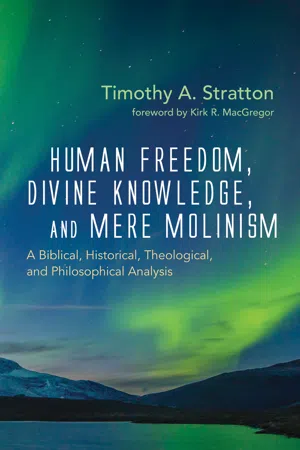![]()
1
Introduction, definitions, and methodology
The question of the relationship between the terms “determinism” and “human freedom” has occupied the thinking of human beings for centuries. Though it is often suggested that Homer, Socrates, Plato, Aristotle, and their writings are the seminal sources of the debate, recent research suggests that the modern use of “free will” has its roots in Stoicism. But the debate must not be merely relegated to the ivory towers of philosophers in academia. It has been and remains a debate in theological and religious venues. Even in philosophical discussions terms are utilized—especially to define or describe what “determinism” means—that are more commonly used in religious contexts. And though those using such terms may not be religious or arguing from a religious perspective, the terms themselves many times have theological and religious connotations: “fate,” “karma,” “destiny,” “predestination,” “decree,” “election,” “fortune,” and “the force,” for instance. Sometimes these terms are used in an ominous sense of humanity being controlled (causally determined) by a force—heredity (genetics), parentage (culture), nature, or even the gods—and the choice of term often identifies the source of the control, whether supernatural (good or evil), the forces of natural law, or some other cause.
Perhaps an illustration of this interplay of philosophy and theology can be seen in what might be labeled a determinism of two sorts: “scientific” determinism and “theological” determinism, both of which stand in contrast to a third variable: libertarian free will.
Scientific determinism.
Scientific determinism arises from the belief that all that exists is nature. It stands to reason that, if nature is all that exists, then everything about humanity would be caused and determined by the laws or forces of nature. However, if everything about a human being is caused or determined by external factors, then this would imply that human beings do not possess the freedom to think or act in a manner opposed to what physics and chemistry dictate. Consequently, it would seem that human beings do not have genuine responsibility for their thoughts, beliefs, behaviors, or actions. Sam Harris, the well-known atheist and naturalist, arrives at the same conclusion about scientific determinism: “Free will is an illusion. Our wills are simply not of our own making. Thoughts and intentions emerge from background causes of which we are unaware and over which we exert no conscious control. We do not have the freedom we think we have. Free will is actually more than an illusion (or less), in that it cannot be made conceptually coherent. Either our wills are determined by prior causes and we are not responsible for them, or they are the product of chance and we are not responsible for them.”
Many scholars are not as honest and forthright as Harris about the implications of determinism. Nevertheless, this is the view of scientific determinism: all events are determined by natural causes.
Theological determinism.
The primary concern of this study is to critically evaluate, not only scientific determinism, but also the issue as to how Scripture and theologians relate their understanding to the issue of human freedom. In contrast to scientific determinism, then, is what might be called theological or divine determinism. The latter has its origins, not only in certain interpretations of select biblical passages, but also in the Bible’s implications on the behavior of Christians. Although seminal sources extend back to St. Augustine and the Pelagians, the issue broke out more recently in the Reformation and, especially, with the spirited debate between the humanist Desiderius Erasmus and the reformer Martin Luther. Erasmus wrote a short treatise called Discourses on the Freedom of the Will to which Luther wrote an extensive refutation called On the Bondage of the Will. In short, Erasmus argued that God created humanity with genuine human freedom and, although infected with sin, humanity nevertheless maintains that freedom and, therefore, is responsible for both good and evil choices. Luther, however, argued otherwise: humanity does not possess free will (at least in soteriological matters) and, as a result, humanity is completely dependent on God to free them from the bondage of their fallenness and their bondage to Satan.
John Calvin’s comment, though similar to Luther’s, is more well-known and quoted: “But those who, while they profess to be the disciples of Christ, still seek for free-will in man, notwithstanding of his being lost and drowned in spiritual destruction, labor under manifold delusion, making a heterogeneous mixture of inspired doctrine and philosophical opinions, and so erring as to both.” Later Calvin added, “Creatures are so governed by the secret counsel of God, that nothing happens but what he has knowingly and willingly decreed.”
Lest one conclude that this is a centuries-old debate and shed from current thinking, one need only to consult the writings of more modern Calvinists who, often basing their arguments on certain biblical passages (such as Romans 9), presuppose that God causally determines all things and, thus, humans are not free. Moreover, since these contemporary Calvinists also affirm that they offer their objections as knowledge claims, they unintentionally join forces with naturalists. Indeed, some Calvinists deny human freedom with as much vigor as does Harris and his atheistic colleagues. Consider, for example, these words from R. C. Sproul: “We cannot soft-pedal this dilemma by calling it a mystery; we must face up to the full import of the concept. If free will means autonomy, then God cannot be sovereign. If man is utterly and completely free to do as he pleases, there can be no sovereign God. However, if God is utterly sovereign to do as He pleases, no creature can be autonomous.”
This, then, is the view of theological determinism or what this author refers to as exhaustive divine determinism (EDD): all events are causally deter...
